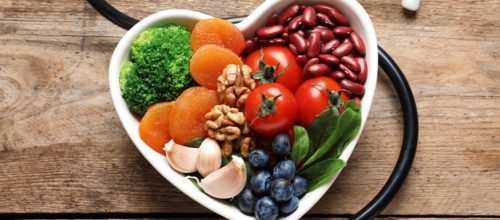
Heart Healthy Diet Tips!
Heart disease is a leading cause of death for both men and women. A healthy diet along with physical activity can help to prevent your risk of developing heart disease. A heart-healthy diet consists of nutrient-rich foods such as fruits, vegetables, whole grains, lean poultry, and fish. It also means avoiding saturated fats, added sugars, and excess sodium. No single food can completely improve your heart health, which is why it is important to eat a variety of heart-healthy foods. Here are some tips to improve your eating habits and to help prevent developing heart disease!
- Eat more fruits and vegetables
Fruits and vegetables are full of vitamins, minerals, and fiber. Most fruits and vegetables are also very low in calories. The substances in fruits and vegetables play a role in preventing cardiovascular disease. Try to pick whole fruits instead of fruit juices or canned fruits. Fruits with the skin such as apples contain more fiber, which can help to keep you full and benefit heart health. If you are choosing to drink fruit juice, aim for products that are made from 100% fruit juice. Choose products lower in sodium and avoid packaged vegetables that are soaked in butter or sauces.
- Choose whole grains
Whole grains have a high nutrient content and are packed with fiber. These products can help to regulate your blood pressure and contribute to good heart health. Whole grain products include oats, quinoa, brown rice, whole-wheat pasta, and whole wheat bread. Try swapping white bread for whole wheat bread or white rice for brown rice. When choosing whole-grain products, look for “100% whole grain.”
- Limit unhealthy fats
Saturated fats should be limited and trans fats should be avoided completely! Trans fat foods include baked goods, fast food, and butter. Saturated fats include red meat and full-fat dairy products. Eating many foods high in saturated or trans fat can increase the level of “bad” (LDL) cholesterol in your blood. High levels of LDL cholesterol in your blood can increase your risk of heart disease and stroke. Focus on eating more unsaturated fats such as olive oil, nuts, seeds, avocado, and salmon. Try swapping skim milk for whole milk or olive oil for butter.
- Choose healthy protein sources
Protein items such as fish, beans, poultry, nuts and low-fat dairy may help to prevent heart disease. Limit the consumption of red and processed meat because these products are typically higher in saturated fats. Processed meats also tend to be higher in calories and salt content. For those who abstain from eating meat, it is still possible to get the recommended amount of daily protein by consuming foods such as quinoa, beans and soy products.
- Reduce your sodium intake
A high sodium diet can lead to high blood pressure, which is a risk of cardiovascular disease. The average recommended sodium intake is 2,300 mg per day. (This is about one teaspoon of salt!) This recommendation can easily be consumed in one fast food meal. To limit salt intake, reduce the amount you use when cooking, eat out less and choose lower sodium products. High sodium products include soups, processed foods, baked goods, and frozen dinners. If you are using a product that is high in sodium, you can reduce the sodium content by soaking it in water for a few minutes and then rinsing it.
- Limit alcohol consumption
Excessive alcohol consumption can lead to an increase in blood pressure. Keep your drinking light to moderate. Men should have no more than two drinks per day, and women should have no more than one drink per day.
Reference:
